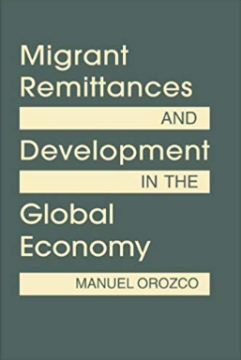The Earthquake’s Impact on Remittances
The earthquake in Haiti has exacerbated an existing distress during the international recession and increased uncertainty of what to do and how to help.
This article was originally published on July 15, 2010 by the Miami Herald under the title "Women still playing catch up."
Women in Latin America have come a long way but aren't there yet. The legacy of Iberian colonialism, male-centered Catholicism and an undemocratic past all contributed to societies that subjugated women to men. Economic backwardness also compounded the unfriendly ambience for women in the region.
Expanding opportunities for women and girls, especially in education, brings dramatic improvements in a society's economic performance and in social indicators like infant mortality and overall health. Latin America, however, has been slow in heeding this well-established finding by social scientists.
While educational and work opportunities have dramatically increased in the past two decades, gender inequalities are still deeply entrenched, particularly for women already marginalized by race or ethnicity and poverty. In 2007, the World Bank issued a four-year action plan — Gender Equality as Smart Economics — to increase women's access to land, the labor market and financial services. Reducing poverty and social exclusion hinges on helping women help themselves and their families.
According to the World Bank's most recent report on women and the formal economy, their participation in the labor force continues to be considerably lower than men's: in most cases, fewer than 50 percent work versus more than three-quarters. Though significantly lower in many countries such as Honduras, Venezuela, Brazil, Colombia, Argentina and Mexico, only Costa Rica has come close to bridging the wage gap with men.
Wage gap endures
In part, earnings differentials can be explained by the type of work many women do: part time in the low-skilled service sector, which pays poorly no matter the gender. All the same, the wage gap has proven resistant to the magic of education: While Latin American women have attained comparable levels to men's, in some cases surpassing them, educated women still have lower rates of labor-force participation and earn less than men. Women in rural areas are at an even greater disadvantage.
In terms of health, women have benefited from improving care, particularly decreasing rates of maternal mortality, though it continues to be a problem in Bolivia, Peru, Ecuador, El Salvador and the Dominican Republic. In the Caribbean, men and women register similar rates of HIV/AIDS infection. Domestic violence still plagues women, especially if married and of low socioeconomic status. Up to 70 percent of Haitian women are battered; Colombia, Central America, Ecuador, Peru and Paraguay also face a high incidence of violence against women.
In a March 2010 report, the Inter-American Development Bank stressed that women were driving current economic growth in Latin America and the Caribbean. Without women's earnings, the poverty rate in two-parent households would be more than 50 percent higher.
This "gender dividend'' — the boost that women's economic autonomy brings to families and society in general — calls for smart policies to bring more women into the labor market.
Families uplifted
Remittances, microfinancing, conditional cash transfers and wage labor provide women with economic autonomy. Women are more likely than men to apply their income to improve nutrition, health and education for their children. Conditional cash transfers in Brazil and Mexico have made a dent on poverty: Small monthly stipends are issued as long as the children are in school and taken to their pediatricians for regular checkups. Brazil, however, has had more success than Mexico in reducing poverty: The Brazilian economy is booming, and Mexico's is not.
By the early 1960s, women had the right to vote everywhere in Latin America. Not until democracy returned or, in some cases, took hold for the first time, beginning in the late 1970s did progress toward gender equality pick up significantly. Civil liberties, strong civil societies and political leaders who can (sort of) be held accountable are imperative for citizens — women and men alike — to make independent claims.
Cuba is a case in point. While making important strides in education, labor-force participation and health indicators, Cuban women cannot freely or publicly raise issues such as domestic violence, teenage pregnancy, the alarmingly high rate of abortions, sexual harassment or, for that matter, the glacial pace of economic reforms and the unelected senior men who lord over them and their families.
Women hold up half the sky, but only in freedom can their efforts make a difference.
The earthquake in Haiti has exacerbated an existing distress during the international recession and increased uncertainty of what to do and how to help.
How do patterns of migration and remittances differ across regions? What kinds of frameworks support the contributions of remittances to local development?
Despite making significant gains in government and politics, women continue to face structural barriers.
 PxFuel / DMCA
PxFuel / DMCA

 Video
Video